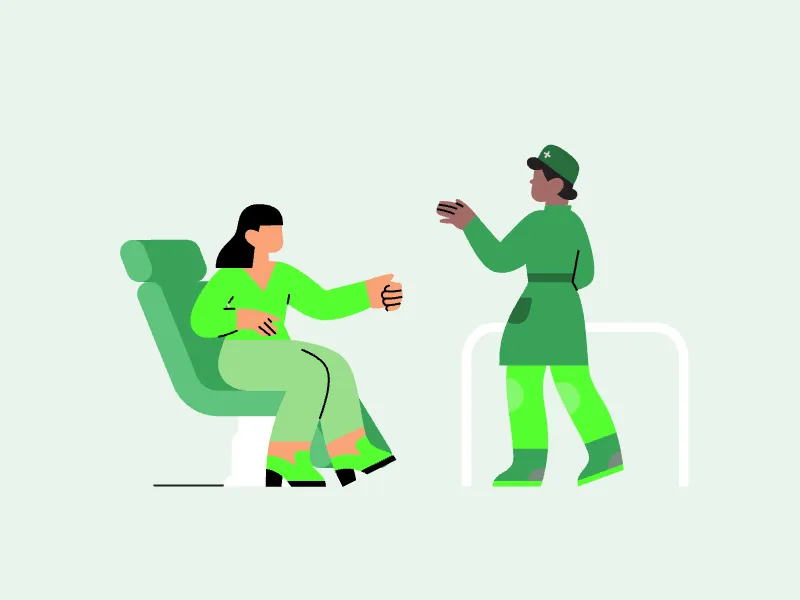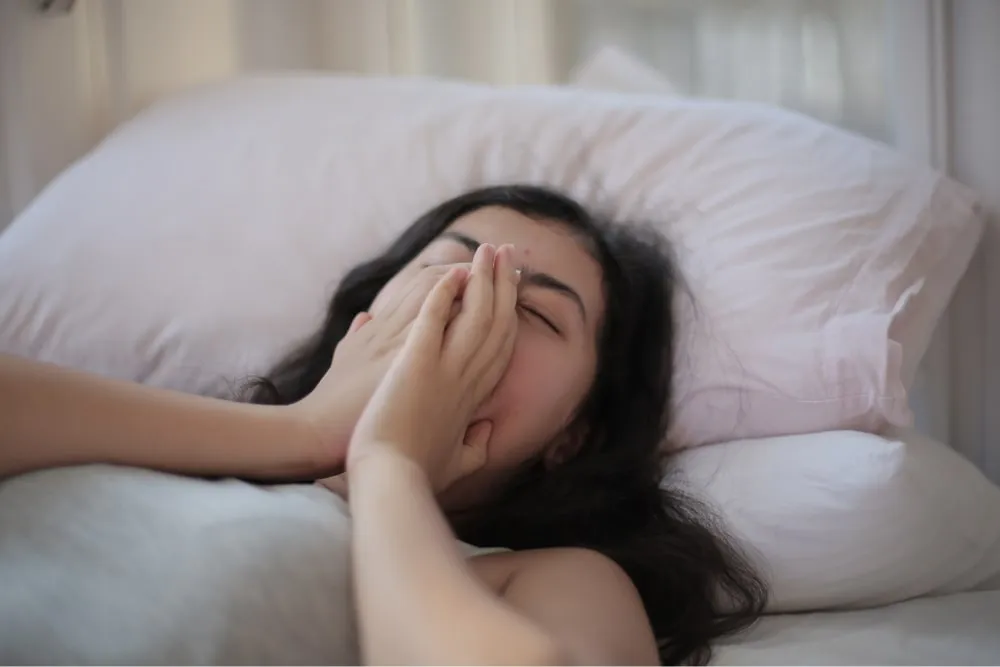Can anorexia cause insomnia?
The science investigating the impact of eating disorders on sleep—and vice versa—is ongoing. And while it's been found that 25%-30% of individuals diagnosed with eating disorders experience symptoms of insomnia, no study has revealed a direct causation between AN and insomnia.2
Still, a number of correlations between AN and sleep disturbances have been found, including:
- Patients with AN experiencing lower sleep quality and more disruptions in sleep5
- Patients with AN taking longer to fall asleep, waking up earlier, and waking up more during the night5
- Male AN patients having increased activity levels during sleep5
- Males with AN tending to sleep less than the general population, getting an average of 6.45 hours a night, compared to 7.1 hours in the general population5
- People with restricting-type anorexia experiencing malnutrition-related sleep deprivation9
Overall, an eating disorder diagnosis of any kind—including AN, bulimia nervosa (BN), binge eating disorder (BED), and night eating syndrome (NES)—has been found to be a predictor of sleeping problems, especially in young adults, with more severe eating disorder symptoms tied to more sleeping problems.3,4 And sleep disturbances of all kinds have been connected to eating disorders, with more than 50% of eating disorder patients experiencing some form of disturbed sleep.5
{{link-bank-one-column}}
Why does anorexia cause insomnia?
There are many reasons why anorexia and insomnia may frequently occur together.
Food choices and quantities directly impact sleep patterns, because food contains the energy and nutrients the body needs to produce the hormones that regulate sleep. Not eating enough food results in the brain not getting enough energy to function properly and vitamin and mineral deficiencies that hinder the body’s production of hormones that regulate sleep.
For example, iron, magnesium, and zinc are essential for getting a good night’s sleep. A recent study found that people who slept less had lower levels of these nutrients.6 And patients with anorexia likewise often have vitamin and mineral deficiencies, including low levels of iron, magnesium, and zinc.
A certain neuropeptide—or chemical carrier in the brain—called orexin, has also been connected to both sleep and hunger cues. High levels of orexin has been associated with both feelings of hunger and increased wakefulness.5
Other mental health disorders, such as anxiety and depression, can also contribute to the relationship between eating disorders and poor sleep. Between 40%-80% of people with anorexia nervosa and other eating disorders experience a co-occurring mood disorder, and anxiety and depression have both been tied to insomnia and a number of other sleep disorders.8,10
You might be interested in
Tips for stopping insomnia
If you or a loved one are struggling with insomnia, there are some ways you may be able to alleviate the issue.
Eat a variety of healthy foods
Getting a good night’s sleep and eating enough—and a variety of—food are essential for your whole health, including your sleep schedule and quality of sleep. Eating a variety of nutrient-rich foods every day can help improve your sleep and stop sleep disturbances.
Some sleep-promoting vitamins and minerals and foods that contain them include:6,11
- Calcium: Dairy products, salmon bones, sardines, green leafy vegetables, almonds, blackstrap molasses, broccoli, cabbage, carob, cheese, collards, dandelion greens, figs, goat’s milk, whey, yogurt
- Magnesium: Pumpkin seeds, almonds, spinach, cashews, peanuts, green leafy vegetables
- Vitamin A: Beef liver, liver sausage, cod liver oil, mackerel, salmon, bluefin tuna
- Vitamin C: Kakadu plum, acerola cherries, rose hips, chili peppers, guavas, sweet yellow peppers, black currants, thyme, parsley, citrus fruits
- Vitamin D: Salmon, herring, sardines, cod liver oil, canned tuna, egg yolks, mushrooms (and sunlight)
- Vitamin E: Wheat germ oil, olive oil, sunflower seeds, almonds, peanuts, peanut butter, beet greens, spinach, pumpkin, red bell pepper
- Vitamin K: Beef liver, green leafy vegetables, broccoli, spinach, cabbage, lettuce
- Zinc: Meat, shellfish, oysters, legumes, seeds, nuts, dark meat of chicken
50% of eating disorder patients experience some form of disturbed sleep.
Work on sleep hygiene
Practicing what is called good sleep hygiene, the behavioral and environmental factors around how and when you sleep, can help with insomnia, too. This includes:7
- Waking up and going to sleep at the same time each day, even on weekends
- Winding down with a calming bedtime routine, such as reading, taking a bath or shower, or meditating
- Removing electronic devices, including TVs, computers, and smartphones, from the bedroom
- Avoiding large meals and caffeine and alcohol consumption before bedtime
- Getting at least some form of physical activity in during the day
But the relationship between food, eating, and sleep is complicated. And the relationship between people who have eating disorders and food is even more complicated.
When insomnia may be a sign of anorexia nervosa
For people who have anorexia nervosa, it’s not quite as easy as just eating more food so the body gets the nutrients it needs to function properly. AN is a serious mental health condition which requires a combination of mental and physical therapy to overcome.
If you are struggling with poor sleep or insomnia, and also experiencing negative thoughts about food, your body, or appearance; find yourself restricting your diet; or are compensating for eating "too much" with things like excessive exercise or laxative use, you may be struggling with AN-related insomnia.
Remote help is available
If you or a loved one are dealing with these issues, it's important to seek out help. Disordered eating and sleeping behaviors can cause a number of mental, physical, and emotional health problems, but all of these can be addressed with the right kind of treatment.
Recognizing you or someone you love might need help is hard. But Within Health is here to help. Call our team today to learn about our first steps for treating eating disorders.
Get help today 
































